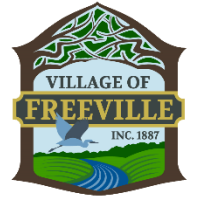Highway and Sewer Department
Pat Brennan
Highway and Public Works Manager
For any sewer or road issues please contact Pat at (607) 745-8110
SEWER FAQs
What is sewer grievance day?
An annual public meeting set by Village law, at which residents may present any concerns or grievances about the sewer system, including its costs or specific home usage ratings.
If I have grievances, can I air them at another time?
Yes. The monthly meetings of the Board of Trustees include a “privilege of the floor,” during which residents may make comments on any Village-related topic. And Village officials can be contacted directly at other times by e-mail or phone (see the Village website, www.freevilleny.org). However, the June grievance day is the best time to address sewer issues, since it is held shortly before yearly rates are set.
What if I have a sewer emergency?
You can call (607) 745-8110 for any emergencies.
What if I have a non-emergency question or a question about my bill?
You can call (607) 844-8301 or email the Village Clerk clerk@freevilleny.org , or stop into the Village Hall during regular hours (Monday, Wednesday and Friday, 8a.m-11a.m.).
How old is the sewer system?
The sewer plant, at the end of DPW Drive, was built in the late 1980s, and is one of the few open lagoon systems in New York State. It is one of the Village’s greatest municipal assets, as our high water table and small lots make septic systems illegal or impractical in much of the Village.
What if a red light is on or an alarm is sounding from a village sewer pump station?
All of the Village’s pump stations have been upgraded to a cellular alerting system that immediately texts the DPW if something is wrong. However, the high-water alert light and alarm remain active as a backup alerting system. If you do notice the light or alarm please call the sewer emergency line at (607) 745-8110.
Does everyone in the village use it?
No, the sewer lines currently do not extend over Fall Creek to the Brooklyn Drive area of the village.
Does anyone outside the village use it?
All of the William George Agency (our biggest customer) uses the system and much of their campus is located outside of the Village. No other outside use is allowed.
Is the system operating at full capacity?
No, the existing system can handle future residential development in the Village.
Why is there sewer service but not municipal water?
When the sewer system was put in place, a municipal water system did not have public support. Freeville is lucky to have abundant water resources that serve our artesian wells, and, based on recent surveys, residents still feel that any benefits of public water do not outweigh the considerable expense that would be entailed.
Does the sewer make a ‘profit’?
No, what is collected in fees is set to balance with the yearly expenses. We do keep a reserve fund balance for major repairs, and budget an amount every year to contribute to that reserve. The amount we contribute per year may change based on the total amount available in reserves. In the Village budget, income and expenses for the sewer operation are kept separate from those of the general fund.
What can I do to keep the rate from going up?
Only put water, septic approved toilet paper, and human waste into the system. This is very important, as the flushing of unapproved items has cost many thousands of dollars in the past for equipment repair. Do not drain your sump pump into the sewer system.
What if I don’t pay my bill?
If your bill is not paid by its due date, a 5% penalty will be added. An additional 5% will be added each month that it remains unpaid. All unpaid sewer charges will be added to the your properties Village tax roll on the first of April each year and collected by the property tax collector.
